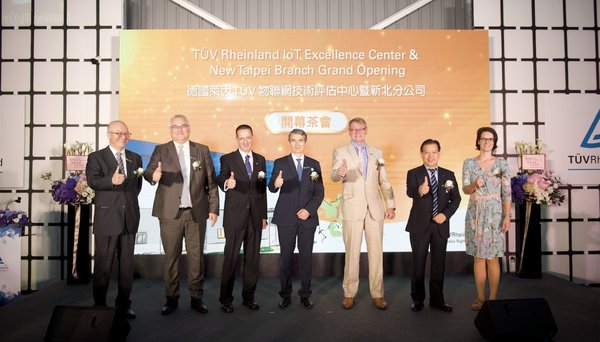TUV Rheinland IoT Center Invests in Three Strategies for Online User Safety
TAIPEI,Oct. 28,2019 -- The coming of 5G is set to take the world into the new age of the Internet-of-Things (IoT). The TUV Rheinland IoT Excellence Center opened on October 24 in Taiwan will help vendors gain access to more than 200 markets around the world. Taiwanese companies seeking to take advantage of 5G opportunities and expand internationally will gain a valuable edge. Top officials such as Ralf Scheller (COO,TUV Rheinland),Holger Kunz (Executive Vice President Products,Yushun Wong (CEO and President,TUV Rheinland Greater China),Max Lyou (Managing Director of TUVRheinland Taiwan),Freddie Hoeglund(CEO,European Chamber of Commerce Taiwan),Dr. Thomas Prinz (Director General,German Institute Taipei),and Leonie Yang (General Manager of DEinternational Taiwan Ltd.,Service Unit of the German Trade Office Taipei) attended the launching ceremony of the IoT Excellence Center on the day.

TUV Rheinland IoT Center Invests in Three Strategies for Online User Safety
IoT Excellence Centers are now being progressively established around the world by TUV Rheinland as part of its 2020 global wireless strategy. After the first IoT center for the Greater China region was established in Shenzhen last year (2018),more than $100 million was invested towards the planning and construction of another IoT Excellence Center in Taiwan. The opening of the new center will help ensure the security of IoT-related software and hardware. The new IoT laboratory offers ten times the wireless testing capacity,increases the frequency range to 300 GHz,and can provide testing services for short-range communication (e.g. Bluetooth,Wi-Fi,Zigbee,RFID,NFC,60 GHz,low-power wide-area network (e.g. Sigfox,LoraWAN),and cellular communication (2G/3G/4G/5G) technologies. Product certification services cover smart home,autotronics,medical electronics,IIoT,and consumer electronics.
TUV Rheinland is leveraging its technical expertise and global network to build IoT security services based around the three core strategies of "product safety," "communication safety," and "information security." IoT technology makes online connectivity even easier,making the management of software/hardware updates on networking devices all the more critical. Businesses must support a higher level of security for customers in everything from sensing technologies to wireless communications,cloud computing,and data management. For the safety of connected products,the power supply can be considered the fountain of life for cloud applications.The quality of the power supply impacts the reliability and stability of application services. In terms of communication safety,the radio spectrum is owned by national governments,and serious signal interference can lead to criminal prosecution. All wireless products being imported or exported must therefore satisfy local government requirements if they are to be offered for sale. e-Commerce platforms such as Shopee and Taobao now require NCC certification for wireless products before they can be listed for sale in Taiwan. The growing number of devices connected to the Internet increases the risk of privacy violations as well. The GDPR (EU General Data Protection Act) and CCPA (California Consumer Privacy Act) are the two most representative pieces of legislation at the international level,and they demonstrate that privacy protection laws have now expanded beyond providers of digital services to include product manufacturers as well. For the sake of information security,TUV Rheinland recommends the evaluation and testing of "privacy protection" and "cyber security" during the initial product/service design phase.
The accelerating pace of 5G commercialization worldwide will see an explosion in the number of IoT devices. Safety management and information security risks will become even more prevalent as well. Due to the popularity of smart devices,every user must now understand that there is a risk that their device may be attacked and compromised. The TUV Rheinland IoT lab is up to date on the latest global communication standards,and is accredited by a number of international communication alliances. It can therefore help companies with their international expansion strategy whether their products are sold in Taiwan or overseas. Arvin Ho,Vice General Manager of ICT department at TUV Rheinland,says:"All wireless communication technologies are usually subject to two types of certification requirements. These are mandatory national regulations and the conformity standard of technology alliances. Certification is recommended before product launch. Products that have been certified will usually demonstrate better interoperability,have no problems passing through Customs,and any issues are easier to pinpoint as well." Many companies that enter the smart medical or smart appliance industry mistakenly believe that all they need to do is put a wireless communication module inside the product. If there is a problem,however,it can be very time-consuming and expensive to fix.
IoT is a very broad field,but it's the applications that really matter. You must first decide which applications to support before choosing which technology to use and which markets to enter. Getting a certification body to assess the safety aspect is recommended during initial product development. TUV Rheinland has 15 IoT labs around the world,located in Germany,Italy,Sweden,Shenzhen,Japan,Taiwan,India,the Netherlands,etc. We provide wireless product certification for market access to the greatest number of countries of any certification body in the world today. We can help save businesses time and effort with rapid localized certification. At the same time,TUV Rheinland has timed the publication of its 2019 Taiwan IoT Communication Technology and Information Security White Paper to coincide with the opening of the IoT laboratory. The extensive experience of TUV Rheinland will help businesses take advantage of new business opportunities and innovations.
Registration link for download of 2019 TaiwanIoT CommunicationTechnologyandInformation Security White Paperhttps://bit.ly/2lSaRkt
Video: https://youtu.be/A0dNrDR4_P8
Photo - https://photos.prnasia.com/prnh/20191028/2623496-1?lang=0